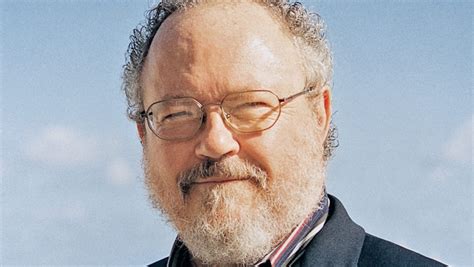Top 372 Medieval Quotes & Sayings - Page 7
Explore popular Medieval quotes.
Last updated on April 17, 2025.
In the vaults of our hearts and brains, danger waits. All the chambers are not lovely, light and high. There are holes in the floor of the mind, like those in a medieval dungeon floor - the stinking oubliettes, named for forgetting, bottle-shaped cells in solid rock with the trapdoor in the top. Nothing escapes from them quietly to ease us. A quake, some betrayal by our safeguards, and sparks of memory fire the noxious gases - things trapped for years fly free, ready to explode in pain and drive us to dangerous behavior.
Satire must always accompany any free society. It is an absolute necessity. Even in the most repressive medieval kingdoms, they understood the need for the court jester, the one soul allowed to tell the truth through laughter. It is, in many ways, the most powerful form of free speech because it is aimed at those in power, or those whose ideas would spread hate. It is the canary in the coalmine, a cultural thermometer, and it always has to push, push, push the boundaries of society to see how much it’s grown.
For so long, it was just my secret. It burned inside me, and I felt like I was carrying something important, something that made me who I was and made me different from everybody else. I took it with me everywhere, and there was never a moment when I wasn't aware of it. It was like I was totally awake, like I could feel every nerve ending in my body. Sometimes my skin would almost hurt from the force of it, that's how strong it was. Like my whole body was buzzing or something. I felt almost, I don't know, noble, like a medieval knight or something, carrying this secret love around with me.
Paul Ryan, who teamed up with Akin in the House to sponsor harsh anti-abortion bills, may look young and hip and new generation, with his iPod full of heavy metal jams and his cute kids. But he's just a fresh face on a Taliban creed - the evermore antediluvian, anti-women, anti-immigrant, anti-gay conservative core. Amiable in khakis and polo shirts, Ryan is the perfect modern leader to rally medieval Republicans who believe that Adam and Eve cavorted with dinosaurs.
The technologies which have had the most profound effects on human life are usually simple. A good example of a simple technology with profound historical consequences is hay. Nobody knows who invented hay, the idea of cutting grass in the autumn and storing it in large enough quantities to keep horses and cows alive through the winter. All we know is that the technology of hay was unknown to the Roman Empire but was known to every village of medieval Europe. Like many other crucially important technologies, hay emerged anonymously during the so-called Dark Ages.
Suttree surfaced from these fevered deeps to hear a maudlin voice chant latin by his bedside, what medieval ghost come to usurp his fallen corporeality. An oiled thumball redolent of lime and sage pondered his shuttered lids.Miserere mei, Deus ...His ears anointed, his lips ... omnis maligna discordia ... Bechrismed with scented oils he lay boneless in a cold euphoria. Japheth when you left your father's house the birds had flown. You were not prepared for such weathers. You'd spoke too lightly of the winter in your father's heart. We saw you in the streets. Sad.
Ah. Medieval-style ransom.” Toot looked confused. “He did run some, but I stopped him, my lord. Like, just now. In front of you. Right over there.” There were several conspicuous sounds behind me, the loudest from my apprentice, and I turned to eye everyone else. They were all either covering smiles or holding them back— poorly. “Hey, peanut gallery,” I said. “This isn’t as easy as I’m making it look.” “You’re doing fine,” Karrin said, her eyes twinkling. I sighed. “Come on, Toot,” I said, and walked over to Hook.
The Divine Comedy is a political poem and when you say poetry is not about - he's always quoted out of context, that "poetry makes nothing happen," that doesn't mean you shrug your shoulders and don't try to make anything happen. And Dante felt that poetry was engaged, there was a point of view; it's not my point of view, it's orthodox medieval Christianity, and I have my troubles with that. He didn't feel that you could just rule out so important a section of life - we care about these things, and it's out of caring about them that we write poetry.
Infuriatingly stupid analysts - especially people who called themselves Arabists, yet who seemed to know next to nothing about the reality of the Islamic world - wrote reams of commentary [after 9/11]. Their articles were all about Islam saving Aristotle and the zero, which medieval Muslim scholars had done more than eight hundred years ago; about Islam being a religion of peace and tolerance, not the slightest bit violent. These were fairy tales, nothing to do with the real world I knew.
That a thing made by hand, the work and thought of a single craftsman, can endure much longer than its maker, through centuries in fact, can survive natural catastrophe, neglect, and even mistreatment, has always filled me with wonder. Sometimes in museums, looking at a humble piece of pottery from ancient Persia or Pompeii, or a finely wrought page from a medieval illuminated manuscript toiled over by a nameless monk, or a primitive tool with a carved handle, I am moved to tears. The unknown life of the maker is evanescent in its brevity, but the work of his or her hands and heart remains.
Your machinery is beautiful. Your society people have apologized to me for the envious ridicule with which your newspapers have referred to me. Your newspapers are comic but never amusing. Your Water Tower is a castellated monstrosity with pepperboxes stuck all over it. I am amazed that any people could so abuse Gothic art and make a structure not like a water tower but like a tower of a medieval castle. It should be torn down. It is a shame to spend so much money on buildings with such an unsatisfactory result. Your city looks positively dreary.
It is not surprising that only one medieval state, Venice, long possessed anything clearly identifiavble as a navy in this sense. We shall see that no state in the British Isles attained attained this level of sophistication before the 16th century, and no history of the Royal Navy, in any exact sense of the words, could legitimately begin much before then. This book, which does, is not an institutional history of the Royal Navy, but a history of naval warfare as an aspect of national history. All and any methods of fighting at sea, or using the sea for warlike purposes, are its concern.











